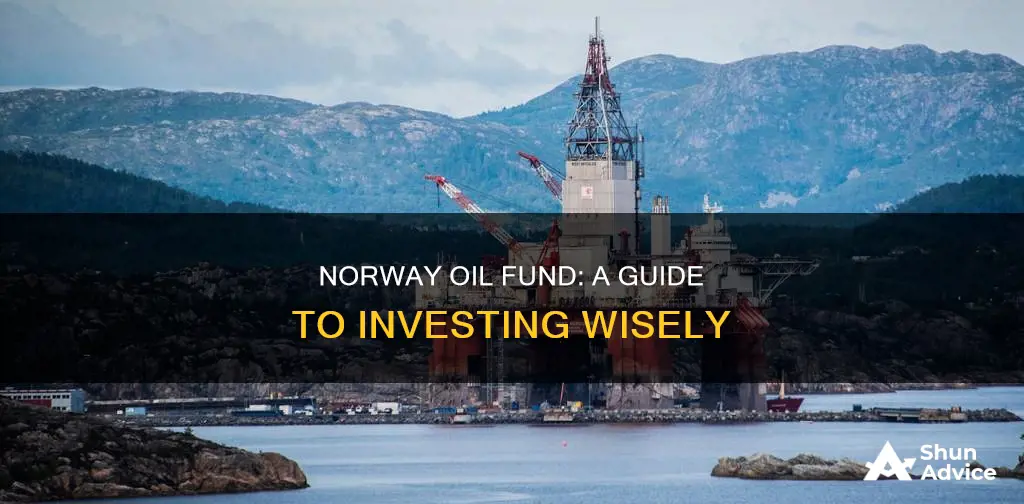
Norway's oil fund, also known as the Government Pension Fund Global, is the world's largest sovereign wealth fund, worth around $1.7 trillion and holding an average of 1.5% of shares in the world's listed companies. The fund was established in 1990 to invest the surplus revenues of the Norwegian petroleum sector and to ensure long-term management of revenue from Norway's oil and gas resources. The fund is managed by Norges Bank Investment Management, part of the Norwegian Central Bank, and its investments are spread across most markets, countries, and currencies. While the fund primarily invests in equities, it also has stakes in bonds, real estate, and renewable energy infrastructure.
Given the size and success of Norway's oil fund, it's not surprising that other countries, including the United States, have expressed interest in establishing similar sovereign wealth funds. However, there are unique factors that have contributed to Norway's success, and it's important to carefully consider the economic and political implications of such funds.
What You'll Learn

The fund's purpose and history
The Government Pension Fund Global, commonly referred to as the Oil Fund, was established in 1990 to invest the surplus revenues of the Norwegian petroleum sector. The fund was set up to shield the economy from fluctuations in oil revenue and to ensure that the money generated from oil is used responsibly and benefits both current and future generations.
In 1969, one of the world's largest offshore oil fields was discovered off Norway. This led to a dramatic increase in the country's economy. Early on, it was decided that revenue from oil and gas should be used cautiously to avoid imbalances in the economy. In 1990, the Norwegian parliament passed legislation to support this, creating what is now the Government Pension Fund Global, and the first money was deposited in the fund in 1996.
The fund is invested in over 9,000 companies in 70 countries worldwide, with holdings in companies such as Apple, Nestlé, Microsoft, and Samsung. It also owns hundreds of buildings in some of the world's leading cities, generating rental income. The fund's investments are spread across most markets, countries, and currencies to achieve broad exposure to global growth and ensure good risk diversification.
The purpose of the fund is to ensure the long-term management of revenue from Norway's oil and gas resources and to act as a financial reserve and long-term savings plan. It aims to safeguard the future of the Norwegian economy and promote an intergenerational transfer of resources. The fund also serves as a fiscal policy tool, limiting government spending and financing the non-oil budget deficit.
The fund has become a hot political issue in Norway, with debates around the use of petroleum revenues, the level of exposure to the stock market, and the ethical nature of its investments. Despite the controversies, the fund has been recognised as an exemplary sovereign wealth fund, known for its transparency, successful asset management strategy, and commitment to ethical guidelines.
Trust Fund Strategies: Investing a Million-Dollar Inheritance
You may want to see also

Investment strategy
The Government Pension Fund of Norway, commonly referred to as the Oil Fund, is the world's largest sovereign wealth fund. It was established in 1990 to invest the surplus revenues of the Norwegian petroleum sector. As of August 2024, it had over $1.71 trillion in assets, with an average of 1.5% of all the world's listed companies.
The fund's investment strategy is guided by a few key principles and rules. Firstly, all investments are made outside of Norway to avoid warping the domestic economy. The fund is invested in over 9,000 companies worldwide, including Apple, Nestlé, Microsoft, and Samsung. The majority of the fund is invested in equities, while another part is invested in bonds, and a smaller portion in real estate and renewable energy infrastructure.
The fund's strategy also involves broad exposure to global growth and value creation, ensuring good risk diversification. The fund's decisions are based on research and analysis of financial markets and the global economy, with a focus on achieving the highest possible long-term return.
In terms of ethical guidelines, the fund does not invest in companies that contribute to human rights violations, nuclear arms production, or severe environmental degradation. The fund has also started divesting from fossil fuel companies and increasing its investments in renewable energy.
The Oil Fund's investment strategy has evolved over time, initially focusing on bonds before expanding into stocks. The fund's management aims to safeguard and build financial wealth for future generations, while also protecting the economy from oil price fluctuations.
Invest in Direct Mutual Funds: Karvy's Smart Guide
You may want to see also

Ethical considerations
The fund has two ethical obligations. Firstly, it should be managed in a way that seeks to secure lasting value creation for current and future generations of Norwegians. Secondly, the fund should avoid investing in companies that cause or contribute to serious violations of ethical norms. The fund's ethical guidelines are based on norms that are widely supported by the Norwegian population, such as human rights, workers' rights, and international environmental conventions.
The Council on Ethics, appointed by the Ministry of Finance, evaluates whether the fund's investments in specific companies are inconsistent with its ethical guidelines. The Council's recommendations are made public, and Norges Bank, which manages the fund, makes the final decision on excluding companies from the fund's portfolio based on the Council's advice. The bank also publishes a list of excluded companies.
The criteria for exclusion include products that are not considered ethically acceptable, such as tobacco, cannabis, certain types of weapons, and coal. It also includes company behaviour that involves gross ethical violations, such as human rights violations, the sale of weapons used to violate international humanitarian law, corruption, environmental damage, and greenhouse gas emissions.
The fund has a mandate from the Norwegian parliament to invest up to 2% of its total value in renewable energy projects, although it has been slow to take up this opportunity due to fierce competition. The fund has faced pressure to divest from oil stocks, and while it has not done so yet, it has committed to freezing and divesting its Russian assets following the country's invasion of Ukraine.
A Guide to Investing in HDFC's Defence Fund
You may want to see also

Political implications
The Government Pension Fund Global (GPFG), commonly known as the Oil Fund, is a sovereign wealth fund established by the Norwegian government in 1990 to invest the surplus revenues of the country's petroleum sector. As the world's largest single sovereign wealth fund, the GPFG has become a hot political issue, with debates surrounding the fund's investment policies, exposure to volatile markets, and ethical considerations.
One of the main political debates revolves around the use of petroleum revenues. There are differing opinions on whether Norway should allocate more of the revenues for the state budget or continue saving the funds for the future. The concern is that increased government spending could lead to higher inflation rates. On the other hand, critics argue that the current investment strategy may result in the state losing out on potential gains due to a lower investment percentage in the stock market.
The high level of exposure of the GPFG to the volatile stock market is another point of contention. Approximately 65% of the fund's assets were invested in equities as of 2017, posing financial risks. However, supporters of the strategy argue that the diversification of investments and the long-term nature of the investments dilute the risk.
The ethical implications of the fund's investment policy have also sparked debates. The GPFG has excluded several companies from its portfolio based on ethical grounds, such as human rights violations, environmental degradation, and involvement in controversial businesses. The inclusion of tobacco and fossil fuel companies in the fund's investments has been particularly controversial. While some argue for divestment from these industries, others defend the financial benefits of maintaining these investments.
The size and influence of the GPFG have led to questions about its potential as a political tool. Jonas Gahr Støre, the leader of the Labour Party, sparked a debate by stating that the fund is a political instrument. This view was met with opposition from the former prime minister, who cautioned against using the fund for political purposes. However, with the election of Støre as prime minister in September 2024, the discussion has shifted towards the role of the fund in addressing climate change and promoting green initiatives.
The GPFG's mandate and investment strategy are determined by the Ministry of Finance, which reports to the Storting (Norwegian parliament). Any significant changes to the investment strategy require the assent of the Storting, ensuring parliamentary oversight. This interplay between the fund and political institutions underscores the political implications and influence of the GPFG.
Municipal Bond Investing: Vanguard Funds for Beginners
You may want to see also

Returns and performance
The Norwegian Government Pension Fund Global, also known as the Government Pension Fund or Norway's sovereign wealth fund, has been one of the world's largest funds since its inception in 1996. The fund's aim is to ensure long-term management of revenue from Norway's oil and gas resources to benefit current and future generations. It has a small stake in about 9,000 companies worldwide, including Apple, Microsoft, Nestlé, and Samsung.
Since 1998, the fund has generated an annual return of 6.30%, or 10,070 billion kroner. In 2021, the fund earned a return on investment of 1.58 trillion Norwegian crowns ($177 billion), the second-highest on record after 2019, with a 14.5% return. Tech stocks contributed the most to this success, returning 30.2%. The fund's CEO, Nicolai Tangen, attributed the positive results to strong equity market developments.
In the first half of 2024, the fund returned 8.6%, equivalent to 1,478 billion kroner. However, in the first half of 2022, the fund saw a loss of 1.68 trillion Norwegian kroner ($174 billion), with a negative return of 14.4% due to global recession fears and high inflation. During this period, the fund's return on equity investments slipped by 17%, while fixed-income investments and unlisted renewable energy infrastructure were down by 9.3% and 13.3%, respectively.
Despite short-term fluctuations, the fund has consistently generated substantial returns over the years, contributing significantly to Norway's economy and the welfare of its citizens.
Li Lu Fund: Investing in the Next Big Thing
You may want to see also
Frequently asked questions
The Norway Oil Fund, also known as the Government Pension Fund Global, is a sovereign wealth fund established in 1990 to invest the surplus revenues of the Norwegian petroleum sector.
The Norway Oil Fund is a collective fund owned by the government of Norway and is not open to individual investors. It is managed by Norges Bank Investment Management (NBIM), part of the Norwegian Central Bank, on behalf of the Ministry of Finance.
The fund has a small stake in about 9,000 companies worldwide, including Apple, Nestle, Microsoft, and Samsung. It is invested in over 9,123 companies across 73 countries, with most of the fund invested in equities, bonds, real estate, and renewable energy infrastructure.







